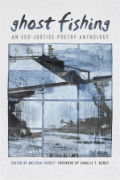Somewhere in this insomniac night my life is beginningwithout me. In Northern Iraq, it is high noon, the sun thereperched over fields shriven with lilies, the petals of orangepoppies red with a light that a gauze of gray sparrowsglides through over sheaves of bone too stubborn to burn,all that is left of those razed towns. Mother turns to Fatherin the cold room they share, offers her hands to his spine.I curl inside her, a silver bangle illuminated by candle’sflame. I curl beside you, lay my head close to the vellumof your smooth back, try again to sleep. Count to 1,000,you suggest. Count to two. Three. As someone must counthacked date trees, hollowed hills paved into gardens, thoughthe scholar on tonight’s Frontline only counted eachtown destroyed: three hundred ninety-seven of them.Who counts dolls, hand- stitched, facedown in dirt?Count to five. Six. Count cadaver, stone, belongings: pots,spun from red clay. Who will count the amputatedhands of thieves? Mother presses a hand to me. Insideher, I thrash, a stalk of wheat blistered by storm. Sleep comes,brief as it is bright. I startle awake, turn to you. The register,I know, is real and beautiful, filled with the names of the dead,elegant strokes of sharp pencil etched into thick pages. Fatherpresses an ear to Mother’s belly. I am wide awake. Countto seven. Eight. Nine. You murmur, turn to me. Someonemust be counting hours spent weaving lace the colorof moonlight for a young girl’s dowry. But I don’t havethe right to count hours, girls, dowries—only the skin-thin pages of the Qur’an I once cut a hollow into, condomsI stored there, cigarettes. Count each minute I waitedfor my parents to fall asleep. Count nights I sat aloneon the curb, held smoke inside my mouth, releasedwhorls of it into the air. Father leaves Mother asleepon her side, the crocus of my fetus nestled inside her.I draw the thin sheet over us. Father reachesfor the Qur’an, thumbs through page after illuminated page,runs a fingertip beneath each line of verse, looks everywherefor the promise of my name.
Register of Eliminated Villages
I have a register which lists 397 eliminated villages, Kurdish villages inNorthern Iraq…it’s a very decorative, pretty thing…—Kanan Makiya, Frontline, 2002
Feature Date
- April 1, 2019
Series
Selected By
Share This Poem
Print This Poem
Copyright © 2018 by Tarfia Faizullah
All rights reserved.
Reproduced by Poetry Daily with permission.
Tarfia Faizullah is the author of Seam and Register of Illuminated Villages. Her poems appear widely in periodicals and anthologies; have been translated into Chinese, Spanish, and Bengali; and have received numerous awards, including a Pushcart Prize and a Fulbright fellowship. Tarfia co-directs the Organic Weapon Arts Chapbook Press & Video Series and is the Nicholas Delbanco Visiting Professor of Poetry at University of Michigan’s Helen Zell Writers’ Program.
"These poems record the perspectives of Asian men and black women, newly published poets and cornerstone voices of the twentieth century, working-class Americans and women who work on their knees clearing landmines 'In Jordan’s Northernmost Province.' In fact, the poets represented between these covers represent far more demographic classifications than I could possibly name. The house built in this anthology is one of many interconnecting rooms."
—Camille T. Dungy, from the foreword
Ghost Fishing is the first anthology to focus solely on poetry with an eco-justice bent. A culturally diverse collection entering a field where nature poetry anthologies have historically lacked diversity, this book presents a rich terrain of contemporary environmental poetry with roots in many cultural traditions.
Eco-justice poetry is poetry born of deep cultural attachment to the land and poetry born of crisis. Aligned with environmental justice activism and thought, eco-justice poetry defines environment as “the place we work, live, play, and worship.” This is a shift from romantic notions of nature as a pristine wilderness outside ourselves toward recognition of the environment as home: a source of life, health, and livelihood.
Ghost Fishing is arranged by topic at key intersections between social justice and the environment such as exile, migration, and dispossession; war; food production; human relations to the animal world; natural resources and extraction; environmental disaster; and cultural resilience and resistance. This anthology seeks to expand our consciousness about the interrelated nature of our experiences and act as a starting point for conversation about the current state of our environment.
Poetry Daily Depends on You
With your support, we make reading the best contemporary poetry a treasured daily experience. Consider a contribution today.




